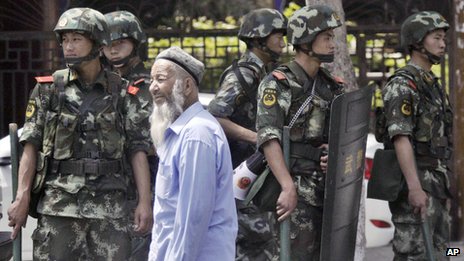At Global Voices, Oiwan Lam reports that residents in a district of Urumqi, the capital of the Xinjiang Uyghur Autonomous Region, are being required to install the Jingwang (净网, literally “web-cleaning”) surveillance app on their cellphones. Authorities are reportedly conducting spot-checks to ensure that residents are complying with the directive. This comes amid two parallel crackdowns that have both been increasing in intensity: one a nationwide anti-terrorism campaign that has focused most effort in the Xinjiang region and has been running since 2014; and the other Beijing’s perennial efforts to reinforce control over online communication and information access that most recently turned focus to blocking individuals’ access to virtual private networks (VPNs).
On July 10, mobile phone users in the Tianshan District of Urumqi City received a mobile phone notification from the district government instructing them to install a surveillance application called Jingwang (or “Web Cleansing”). The message said the app was intended to “prevent [them] from accessing terrorist information.”
But authorities may be using the app for more than just counter-terrorism. According to an exclusive report from Radio Free Asia, 10 Kazakh women from Ili Kazakh Autonomous Prefecture were arrested for messages sent to a private WeChat group chat soon after they installed the app.
The notification from police said the application would locate and track the sources and distribution paths of terrorists, along with “illegal religious” activity and “harmful information,” including videos, images, ebooks and documents.
[…] The move is consistent with other measures of control over digital activities in the region. While stories of digital censorship in China often focus on the experiences of users in major cities in the east and south, the reality is often more bleak for those living in remote, embattled ethnic minority regions such as Xinjiang and Tibet. Seeking to contain unrest and discontent in conflict areas, authorities often impose extreme censorship and surveillance measures and routine Internet shutdowns. [Source]
Surveillance measures in Xinjiang have been increasing since the beginning of the ongoing anti-terror drive. Foreign correspondents attempting to cover the region, where information is under especially tight official control, have reported being surveilled and harassed by authorities amid the crackdown. This week, The New York Times’ outgoing Beijing bureau chief Edward Wong described the increasingly close watch he experienced and observed while reporting from Xinjiang over recent years. For more on tightening security efforts in Xinjiang, see prior coverage via CDT.
Heavy digital surveillance is also used as a security measure in other ethnic and religious minority regions, such as the predominately Christian Wenzhou region of Zhejiang and in Tibet, where author and poet Woeser wrote in 2013 cell phones have become an “embodiment of fear” and a constant police escort. In an essay on increasingly intrusive surveillance and registration requirements recently translated by CDT, journalist Jiang Xue recalled a friend’s comment: “Go take a look at Xinjiang or Tibet. Everything’s already like this, or much worse.”
The Kazakh women’s arrest may have derived as much from their use of WeChat as from the Jingwang software. Taiwanese NGO worker Lee Ming-che was apparently arrested by Chinese authorities for subversion in May partly due to intercepted WeChat messages he had sent about Taiwanese democracy. In 2013, CDT translated an anonymous journalist’s account of being contacted by police after discussing a planned protest on a WeChat group. In 2012, activist Hu Jia reported that state security officers had quoted WeChat messages he wrote back to him.
Meanwhile, amid mounting official political sensitivity and censorship following the death of political prisoner Liu Xiaobo and ahead of a leadership transition later this year, China-based users of the popular Facebook-owned, Signal-encrypted messaging app WhatsApp reportedly began experiencing widespread service disruptions this week. A follow-up report from the South China Morning Post surveys experts who don’t believe that security on the platform has been compromised despite the disruptions. As GreatFire.org’s Charlie Smith told the AP, “it would not be surprising to find that everything on WhatsApp gets blocked, forcing users in China to use unencrypted, monitored and censored services like WeChat.”







